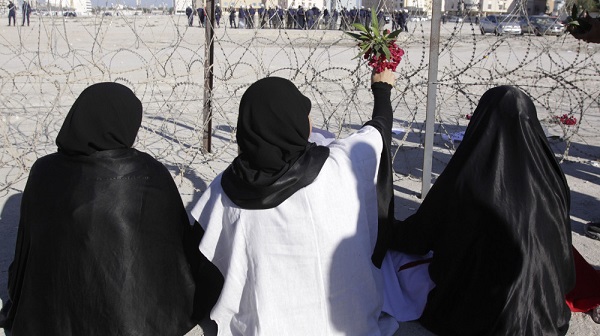Alwaght- Sentencing to death two teenagers by Bahrain’s court recently once again brought to an international spotlight the debate about the torture in the Al Khalifa regime’s prisons beside drawing protests from the international rights organizations about the government’s suppressive approach to the peaceful demonstrations in the Persian Gulf tiny kingdom.
On Sunday, The EU Parliament’s Human Rights Commission and its Delegation for relations with the Arab Peninsula in a joint statement criticized the Manama regime’s court of appeal for the evidence of torture of Mohammad Ramadan and Hussein Mousa, two teenagers sentenced to death by the court.
Rights organizations have recently said they have found evidence of torture behind confessions of the two teenagers.
According to a report by Aljazeera news network, the EU Human Rights Commission and the Delegation for relations with the Arab Peninsula recently in a joint statement have stated their frustration with the Manama regime for lack of proper investigation by the government watch committees looking into the claims of torture and forced confessions into the case of two political prisoners torture in Bahraini jails.
The two European bodies asked the Bahraini government to adhere to its international commitments to Huma rights and withdraw the death sentences and start an “independent” probe into the torture cases.
The two committees asserted that international laws definitely oppose the death sentence and forced confessions.
They added that they especially have concerns about the detainees with medical conditions including the opposition leaders like Hasam Mushaima and Abdulhadi al-Khawaja.
The torture policy against the prisoners after the 2012 uprising in Bahrain was adopted by the ruling regime of Al Khalifa to put strains on the protests to put down the opposition and suppress the demonstrations.
Sheikh Ali Salman, the leader of the dissolved Al-Wifaq society and Nabil Rajab, a leading pro-rights figure in Bahrain, are among the political prisoners.
Sheikh Hussein al-Daihi, the deputy leader of Al-Wifaq, in a Twitter post said that the death sentences in Bahrain go against the public demands. Despite this fact, long-term prison rulings are still being issued. “The regime’s goals are clear. It wants to dissuade our nation from following its legal demands and break its firmness,” he added.
He went on that the rulings are a result of the regime’s barring people from political participation. The “corrupt” judiciary should be responsible for that, her said.
Elsewhere he asserted that during the popular uprising tens of crimes were committed against the people of Bahrain inside the prison and outside it. Many people were killed or tortured using various ways. Despite these violations, we have not heard even a single sentence against those committing the crimes. This is while the death sentences await all of those struggling for political freedom and justice.
Coronavirus outbreak, a new tool for suppression and pressure
Since the outbreak of the coronavirus pandemic in the country, the Al Khalifa regime said that it was fully committed to the heath of the prisoners.
However, the prisoner Ali al-Haji last month in a phone conversation with Reuters news agency made revelations about the regime’sking exploitation of the coronavirus crisis to put pressure on the prisoners. According to him, the prison authorities have banned family visits under the excuse of heath codes. He said that protective gear is not available to prisoners and even the prison staff, however.
On June 15, 60 European Parliament members in a letter to the Bahraini King Hamad Bin Isa Al Khalifa asked him to release the political prisoners amid coronavirus outbreak, including opposition leaders like Hasan Mushaima.
They expressed their concerns over the continued holding of political prisoners despite the pandemic and critical health conditions of some of them.
The letter said that the European Parliament welcomed the release of 1786 prisoners on March 17. But prominent political figures remain behind the bars. Additionally, the coronavirus cases are increasing in the prisons and thousands of prisoners will likely be infected as the prisons remain overcrowded.
The members of the European Parliament continued that preventive measures like social distancing in the Bahraini jails are impossible with regard to the congestion and that some prisoners are in desperate need of medical care.
Bahrain sets patterns for torture
Over the past 9 years, Bahrain has been scene to anti-regime protests. The protesters demand the ouster of Al Khalifa rulers and the establishment of a democratic government representing all of Bahrainis.
In response, Manama rulers have turned a blind eye to the popular demands and adopted a heavy crackdown on the uprising on the strength of the Saudi and Western backing.
To facilitate faster quelling, the king-appointed parliament approved on March 5 trials of civilians by martial courts.
The continuation of the Bahraini prisoners drew support to them from the Salam for Democracy and Human Rights (SALAM DHR). In the world torture victims day, the rights group blasted systematic and constant torture of the political prisoners and said it was regretful that the government frequently turned down demands by the special UN rapporteur on torture to visit the regime’s jails. The organization also called for an end to the immunity offered to the torturers and the “oppressive and inhuman or humiliating behavior in the Bahraini prisons.” But these demands have received no smallest addressing as the regime in Manama sees the Riyadh and Washington support behind its suppression.



























